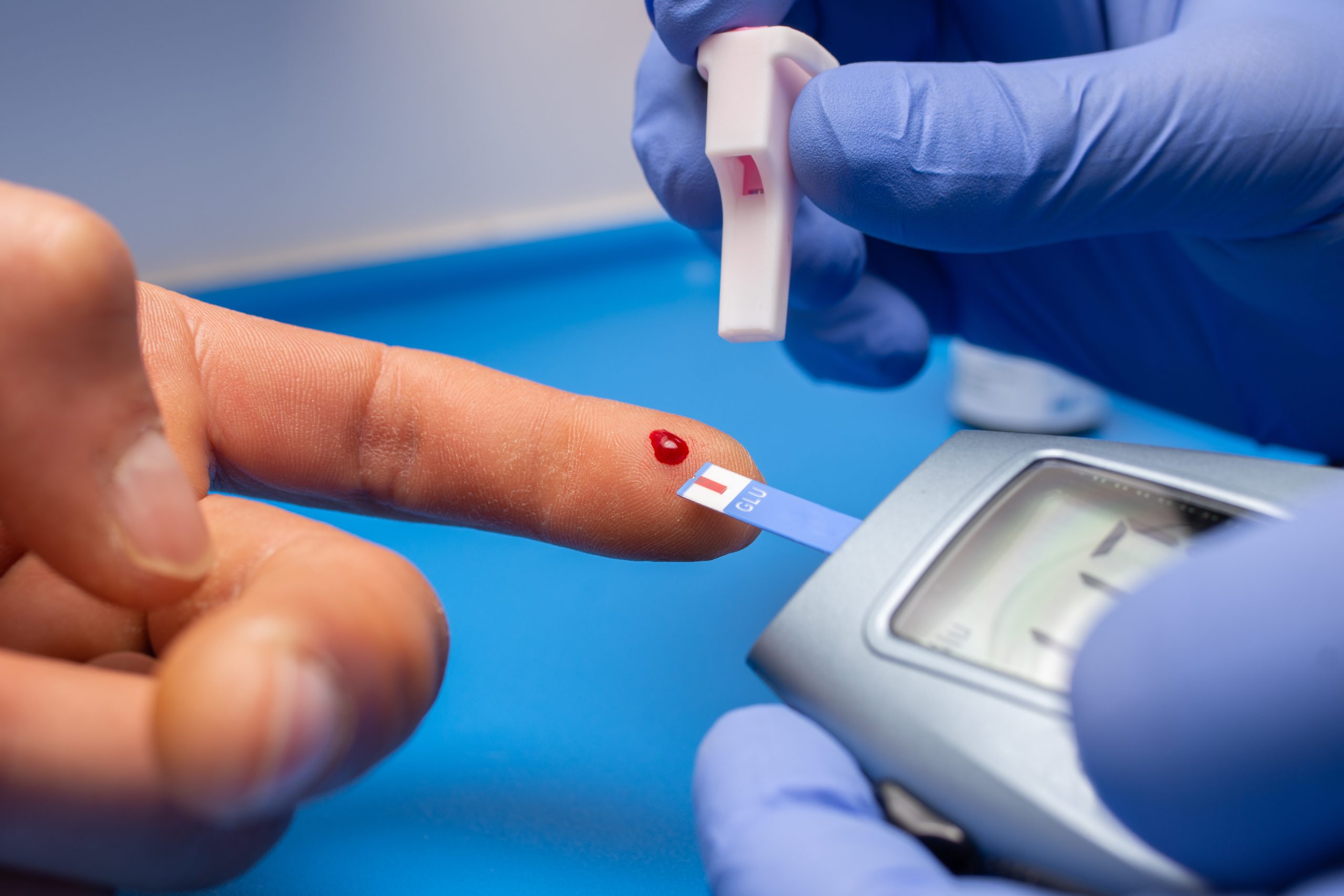
This post may contain affiliate content from which we earn a small commission at no additional cost to you. Read our full disclosure.
Ever wondered why managing your blood sugar levels is crucial for shedding those extra pounds? Well, let’s unravel the mystery behind it. The Link Between Blood Sugar Levels and Weight Loss is fascinating and worth exploring.
Understanding how what we eat affects our blood sugar can be a game-changer in our weight loss journey. So, buckle up as we dive into the science behind this intriguing connection, and discover how it can help you achieve your health goals.
The Basics of Blood Sugar

At the core of this connection lies the concept of blood sugar, or glucose, which serves as the primary source of energy for the body’s cells. Whenever we consume carbohydrates, whether from grains, fruits, or starchy vegetables, they are broken down into glucose during digestion. This glucose then enters the bloodstream, causing blood sugar levels to rise.
Blood Sugar Regulation and Weight Management
Maintaining stable blood sugar levels is crucial for overall health and plays a significant role in weight management. When blood sugar levels spike rapidly due to the consumption of high-glycemic carbohydrates or sugary foods, the body responds by releasing insulin, a hormone produced by the pancreas.
Insulin helps transport glucose from the bloodstream into cells, where it can be used for energy or stored for later use.
However, frequent spikes and subsequent crashes in blood sugar levels can disrupt this delicate balance, leading to increased hunger, cravings, and overeating. These fluctuations in blood sugar can sabotage weight loss efforts by promoting excessive calorie consumption and interfering with the body’s ability to burn stored fat for energy.
If you want to lose weight, you can try out Beyond Body. You may ask, “What is Beyond Body?” For that, you can read our Beyond Body review. Check the code below to get up to 60% off.


Beyond Body - 67% Off Discount Code
The Role of Insulin in Fat Storage

Beyond its role in blood sugar regulation, insulin also plays a crucial role in fat storage. When blood sugar levels are elevated, particularly in response to a high-carbohydrate meal or snack, the body releases insulin to facilitate the uptake of glucose into cells.
However, excess glucose that is not immediately needed for energy is converted into fat and stored in adipose tissue for future use.
In essence, insulin acts as a “storage hormone,” signaling cells to absorb glucose and store it as fat. Consequently, chronically elevated insulin levels, often resulting from a diet high in refined carbohydrates and added sugars, can promote weight gain and hinder weight loss efforts.
Impact of High Blood Sugar on Metabolism
Persistent elevation of blood sugar levels can lead to insulin resistance, where the body becomes less responsive to insulin. This triggers increased insulin production, creating a cycle of resistance and elevated insulin levels.
Insulin resistance impairs blood sugar regulation and interferes with fat breakdown, making weight loss challenging. It’s closely linked to metabolic syndrome, raising the risk of type 2 diabetes and heart disease. Addressing blood sugar regulation is crucial for weight loss and overall metabolic health.
Strategies for Balancing Blood Sugar and Promoting Weight Loss

Achieving and maintaining optimal blood sugar levels is a key component of successful weight loss. Fortunately, there are several strategies that individuals can implement to support blood sugar regulation and facilitate weight loss:
Focus on Whole, Nutrient-Dense Foods
Incorporate a variety of whole foods into your diet, including fruits, vegetables, lean proteins, and healthy fats. These nutrient-dense foods provide essential vitamins, minerals, and antioxidants while supplying a steady source of energy without causing rapid spikes in blood sugar.
Limit Refined Carbohydrates and Added Sugars
Minimize your intake of refined carbohydrates, such as white bread, pasta, and pastries, as well as sugary beverages and snacks. These highly processed foods can cause sharp increases in blood sugar levels and contribute to weight gain over time.
Choose Low-Glycemic Index Foods
Opt for foods with a low glycemic index (GI), which is less likely to cause rapid fluctuations in blood sugar levels. Examples of low-GI foods include whole grains, legumes, nuts, and non-starchy vegetables.
Eat Balanced Meals and Snacks
Aim to balance your meals and snacks with a combination of carbohydrates, protein, and healthy fats. This macronutrient balance can help slow the absorption of glucose into the bloodstream and promote satiety, reducing the likelihood of overeating.
Wanna know what to eat during weight loss, you can read our article “Tips for Eating Out While Losing Weight”.
Stay Hydrated
Drink plenty of water throughout the day to stay hydrated and support optimal metabolic function. Dehydration can exacerbate fluctuations in blood sugar levels and increase feelings of hunger and fatigue.
Engage in Regular Physical Activity
Incorporate regular exercise into your routine to improve insulin sensitivity, promote fat burning, and support overall metabolic health. Aim for a combination of aerobic exercise, strength training, and flexibility exercises for optimal results.
Manage Stress and Prioritize Sleep
Practice stress-reduction techniques such as meditation, yoga, or deep breathing exercises to lower cortisol levels and promote better blood sugar control. Additionally, prioritize adequate sleep to support overall metabolic function and regulate appetite hormones.
Beyond Body – The Definitive Guide to Shedding Pounds
Embark on a groundbreaking approach to well-being with Beyond Body, where customized meal and fitness plans are crafted to suit your individual tastes. Experience a 28-day adventure that redefines your relationship with nutritious eating, relishing in wholesome and delectable meals tailored just for you.
Beyond Body transcends conventional weight loss solutions; it evolves into your personalized ally, guiding you toward a life of vitality and contentment. Ready to kickstart this transformative journey?
Explore our in-depth Beyond Body review, then tap here to take a brief questionnaire and initiate your tailored journey. Plus, access savings of up to 60% off with the exclusive code provided below:


Beyond Body - 67% Off Discount Code
Final Words
In conclusion, understanding the connection between blood sugar levels and weight loss is crucial for effective management. By maintaining stable blood sugar levels through balanced eating habits and regular physical activity, individuals can support their weight loss journey.
This balance helps regulate hunger, energy levels, and metabolism, contributing to sustainable and healthy weight management. Making small, consistent changes to lifestyle habits can lead to long-term success in achieving weight loss goals.
FAQs on the Link Between Blood Sugar Levels and Weight Loss
Does blood sugar level affect weight loss?
Blood sugar levels do play a role in weight loss. When blood sugar levels are stable, it’s easier for the body to burn fat. High blood sugar levels can hinder weight loss efforts by promoting fat storage instead of burning it for energy.
How do you feel when your blood sugar is too high?
When blood sugar is too high, you might feel tired, thirsty, and have blurred vision. You might also experience frequent urination and feel irritable or anxious. It’s essential to monitor blood sugar levels regularly to maintain overall health.
How does sugar affect weight loss?
Sugar can affect weight loss by causing spikes in blood sugar levels, leading to increased cravings and overeating. Consuming too much sugar can also lead to insulin resistance, making it harder for the body to use stored fat for energy, ultimately hindering weight loss efforts. It’s crucial to limit sugar intake for effective weight management.
- Online Vs In-Person Certification Courses: Pros & Cons - April 23, 2024
- Tips for Acing Your Fitness Certification Exam - April 21, 2024
- Balancing Work-Life as a Fitness Trainer: Complete Guide - April 19, 2024
Disclosure: In the spirit of full disclosure, DIYactive.com may be compensated in exchange for featured placement of certain reviews or links on this website. View our full disclosure.



